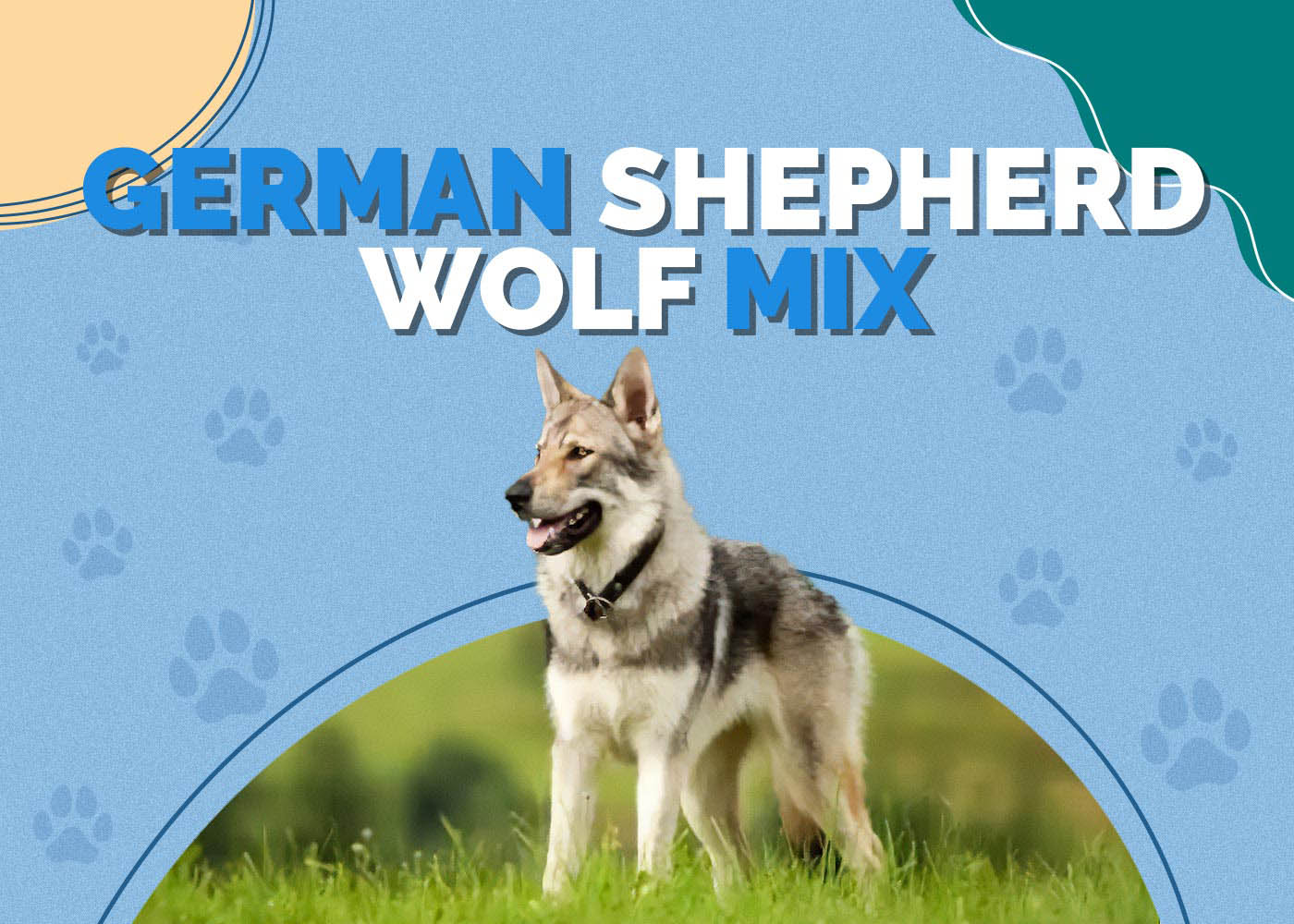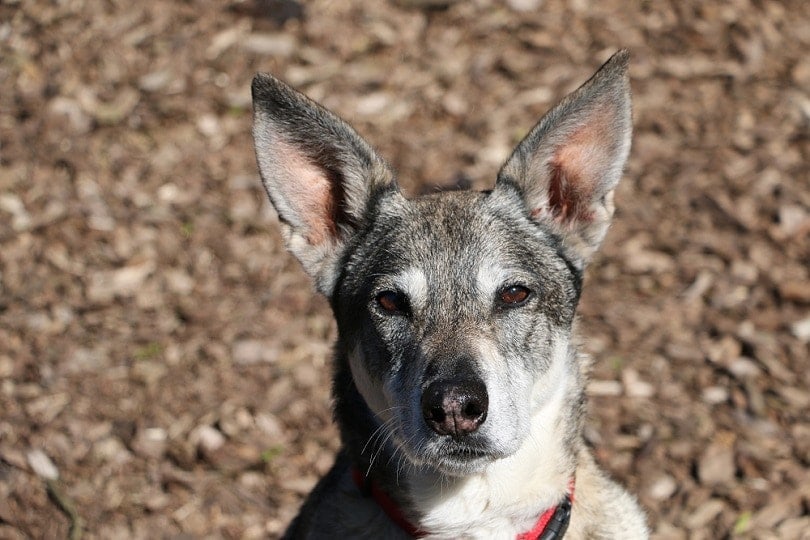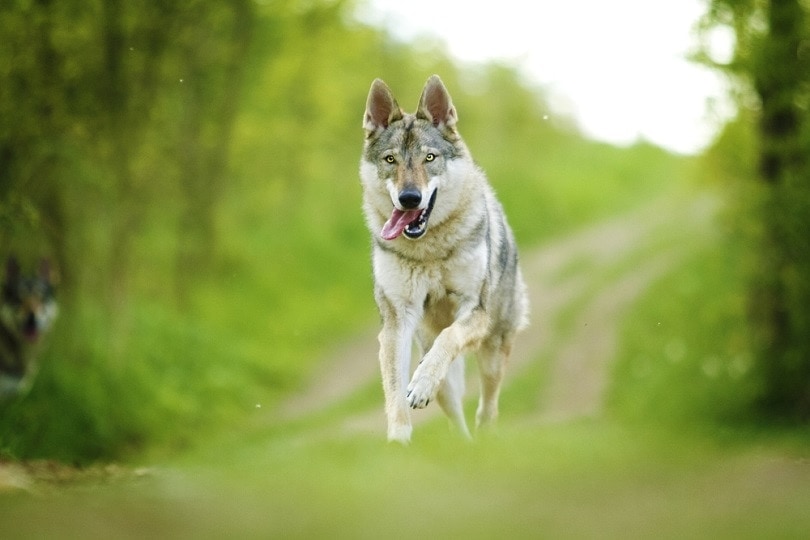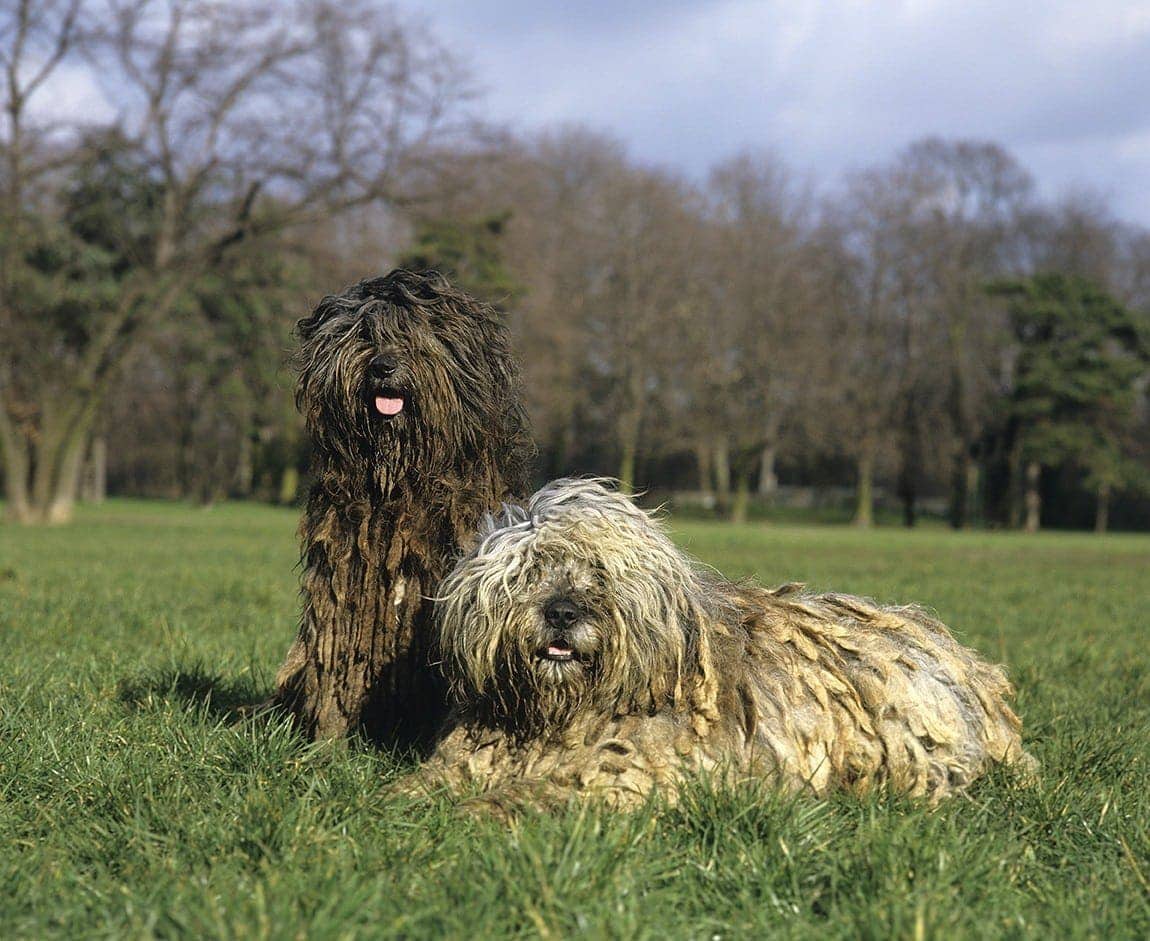German Shepherd Wolf Mix: Info, Pictures, Characteristics & Facts
Updated on

Click to Skip Ahead
| Height: | 20-26 inches |
| Weight: | 50-100 pounds |
| Lifespan: | 10-14 years |
| Colors: | Black and tan, sable, white, red, brown, mottled gray |
| Suitable for: | Active families, those looking for a dog that stands out in a crowd |
| Temperament: | Loyal, reserved, mischievous, energetic, playful, independent |
German Shepherds can be intimidating dogs. There’s a reason that they’re widely used by both the police and military: They’re strong and intelligent and can be absolutely ferocious when they want to be. But sometimes that’s not enough. Sometimes, you need something even more fearsome.
That’s when you mix a German Shepherd with a wolf. That’s right — a wolf.
This is a rare mix, so it’s unlikely that you’ve come across one before. To learn more about how the two sides combine into one amazing animal, read on.
German Shepherd Wolf Mix Puppies

Before we delve too deeply into the world of German Shepherd Wolf mixes, there’s a big disclaimer: These dogs aren’t legal in all jurisdictions.
Many places have laws against owning any sort of wolf mix, including a German Shepherd-Worf hybrid. This is because, unlike dogs, wolves are completely wild animals, and while they can be domesticated to a certain extent, that wild streak is likely to live on.
That’s not to say that every wolf mix is dangerous; some of the sweetest animals in the world are wolf mixes. It just means that in extreme circumstances, these dogs are likely to be less predictable than those without wolf DNA inside them.
Even if it’s okay for you to own one of these dogs where you live, you shouldn’t bring one home unless you’re a very experienced dog owner. They require a ton of training and socialization, and if you’re not confident in your skills in either department, you’ll be playing with fire.
Wolf mixes are popular because they’re different from regular dogs and because they’re absolutely gorgeous animals. The appeal is undeniable, but you still need to do your homework before adding one to your pack.
3 Little-Known Facts About the German Shepherd Wolf Mix
1. There Is No Breed Registry for Wolf Mixes
Not only are wolf mixes not recognized by the AKC or other licensing organizations, but there’s no registry for them at all. That means there’s no reputable way to prove that your German Shepherd Wolf mix has any actual wolf in them at all.
In fact, there’s some dispute as to what a wolf mix actually is. Most experts would contend that a wolf mix is one with a purebred wolf in its bloodline within four or five generations. Others dispute that claim, however, and have their own metric for calling something a “wolf mix.”
Regardless of which metric you ultimately use, however, there’s really no way to know if your German Shepherd Wolf mix is a wolf mix at all. It’s just another thing to keep in mind if you’re considering purchasing one of these animals.
2. The “Wolf-Like” Behavior Often Doesn’t Start Until Adolescence
If you bring a German Shepherd Wolf mix puppy home, you’ll likely think that you got a regular dog. They act just like canine puppies for the most part.
However, once they start to grow up, the wolf-like tendencies begin to emerge. They can start slowly in adolescence before becoming extremely apparent in adulthood. However, every animal is different, and depending on which parent’s genes won out, your mix may stay dog-like their entire lives.
Many people have fallen in love with a wolf mix puppy, thinking that it has the features of a wolf but the sweetness of a dog. That may be true in some cases, but in others, the animal grew up to be quite a fearsome pet indeed.
3. They Can Be Quite Unpredictable
You would think that a wolf mix would be proud and fearless, never backing down from anyone or anything. The fact of the matter is that while these dogs can certainly be ferocious, they also tend to be extremely shy and skittish.
Wolves are scared of people (and for good reason, sadly). That means that while your German Shepherd Wolf mix would readily sacrifice their own lives to protect their family, they usually also prefer to cower and hide when strangers arrive.
That can lead to dangerous situations, especially with children. Many people feel the need to “force” their mix to be social and put them in situations that they find uncomfortable. If you push these dogs past their breaking point, the wolf will eventually come out — and that can have tragic results.

Temperament & Intelligence of the German Shepherd Wolf Mix 🧠
The temperament of a German Shepherd Wolf Dog mix will depend in large part on which parent’s genes win out. Some of these animals take after their canine parents, while others favor their wolf lineage. Generally speaking, though, you can expect your German Shepherd Wolf mix to be fiercely loyal and protective of their families yet wary of outsiders. They prefer to run and hide when trouble arises, so they’re actually not the best watchdogs on the planet.
Due to the wolf in them, these dogs tend to be more pack-driven than other pups. As a result, they may be prone to separation anxiety, and they do best in families where they’ll have plenty of company. You may even want to give them a canine companion, although this can have its own set of challenges.
They’re smart animals, as German Shepherds are some of the most intelligent dogs on the planet, and wolves are known for being clever as well. They can pick up on commands quickly, although they’re not quite as eager to please as a regular German Shepherd would be.
That intelligence makes them capable escape artists, though. They are prone to wanderlust, so if you don’t have an incredibly secure backyard, they may be able to find a way to get out. You’ll need a large fence with plenty of fail-safes.
Are These Dogs Good for Families? 🏡
German Shepherd Wolf mixes will protect their families with their own lives, but that doesn’t necessarily make them great family pets.
The fact is that you shouldn’t bring a dog with wolf DNA into a home with small kids. They’re simply too unpredictable — both wolf mixes and small children. Little ones will often push a pet too far, and you never know when the wolf will come out.
If you do bring one of these animals into a home with little kids, never leave them unsupervised. You should also teach your kids how to deal with the dog, making sure they know not to mess with their food or toys or abuse them in any way.
Older kids may be able to get along with them, though, so if your children are a little more mature, you might be able to bring one of these dogs home without issue. You’ll still need to socialize the dog thoroughly, though, and be especially careful when they have friends over.
All of this assumes that you know how to handle one of these animals, of course. If you’re an inexperienced owner, then you should get something easier to own, like a Labrador.
Does This Breed Get Along With Other Pets? 🐶 😽
Given how pack-oriented these dogs are, many German Shepherd Wolf mixes thrive with other dogs in the house. They get lonely easily and may become depressed if left alone for long periods of time. However, they may be prone to aggression with other dogs as well. Pack culture is a much bigger deal for wolves than for dogs, so your mix may be prone to dominance. You’ll want to socialize your mix as much as possible before introducing them to another pup.
Other pets, however, are likely a bad idea. Cats and smaller animals will most likely be seen as food rather than friends, so you should keep your German Shepherd Wolf mix as far away from them as possible.
That’s not to say that it’s impossible to have a German Shepherd Wolf mix and a cat, but it’s extremely risky. We feel that it’s not worth taking the chance.
All of this also means that you need to be absolutely certain that your mix is kept on a secure leash and collar (or harness) during walks. If they get loose, they may attack other animals, including your neighbors’ pets.

Things to Know When Owning a German Shepherd Wolf Mix
Owning a German Shepherd Wolf mix presents all sorts of challenges that you won’t find with other breeds. You may not feel up to the task once you realize how much is involved with raising one of these animals.
To better prepare you for the experience, we’ve put together a brief guide that outlines proper ownership of a German Shepherd Wolf mix.
Once you know the basics, you’ll find that keeping one of these dogs around isn’t quite as challenging as it may first appear, but it’s still a task best left to those who know what they’re doing.
Food & Diet Requirements 🦴
Depending on the size of the wolf involved in making your mix, you could have an average-sized dog or a big one on your hands. That will affect how much they eat, but you can expect them to have a healthy appetite regardless.
You should feed them a kibble that’s high in protein, as this will give them plenty of lean meat as fuel. These are energetic pups, so they need as much long-lasting energy as they can get. Also, look for a food that’s high in fat to keep them feeling full for longer and high in fiber for regularity.
Avoid problematic ingredients like soy, wheat, corn, or animal by-products, as these can make your dog fat without giving them much in the way of nutrition. Many dogs have trouble processing these ingredients as well.
These dogs can be prone to joint and spinal issues later in life, especially if they’re on the larger side, so it’s essential to keep their weight under control. In addition to feeding them a proper diet, you should exercise strict portion control and never allow them to free-feed.
You may want to give your dog a glucosamine supplement (or something else for joint support) starting when they’re puppies. This will help stave off a few of those problems, but the most important thing is ensuring that they don’t become overweight.
Exercise 🐕
Both parent animals are extremely energetic, so it’s to be expected that a mix of the two would have quite a bit of vim and vigor. As a result, expect to provide your pet with plenty of exercise.
It’s especially important because these dogs can become destructive if bored. They’ll chew up shoes or furniture, but their favorite thing is to dig holes. They can easily destroy your entire lawn if not properly tuckered out.
You’ll likely need to provide them with 1-2 hours of exercise per day. It will be easier if you have a large backyard that they can patrol, but even if that’s the case, you’ll still need to provide them with something a little more challenging.
Long walks are a good idea, but you should also play fetch or something that requires more energy every day. Just be careful not to make them run and jump too much, as it puts quite a bit of strain on their spines.
Mental stimulation is equally important. You can give them puzzle toys, play hide-and-seek, or put them through extensive training sessions.

Training 🦮
Training isn’t optional with a German Shepherd Wolf mix. These dogs are powerful and can be unpredictable, so if you don’t have a good handle on their behavior, you could be setting yourself up for disaster.
Their natural intelligence allows them to pick up commands fairly quickly, but they’re usually more independent than pure German Shepherds. As a result, they may not be particularly eager to please, and you’ll need a firm hand to get the results that you desire.
Please note that “having a firm hand” does not mean being abusive to the animal. They respond best to positive reinforcement, so try to convince them to cooperate by offering them treats or affection.
If you punish these dogs, they’ll likely cower and withdraw. Not only does this reduce the likelihood that you’ll get the desired behavior out of them, but it could also lead to them repressing their emotions. The problem with this is that eventually, those emotions will boil over. That could lead to unpleasant consequences for you.
If you’re not confident in your training abilities, you shouldn’t get any kind of wolf mix. You could always enlist the services of a professional trainer, but these animals will respect you more if you’re the one issuing commands.
Grooming ✂️
One thing that both German Shepherds and wolves can agree on is shedding as much as possible. If you own a mix, you’ll have to deal with a large amount of dog hair, so just get used to it.
The shedding becomes extreme twice a year when the dogs blow their coats. You’ll want to take them to a professional groomer at these times just to keep the problem somewhat under control.
You’ll also need to brush them regularly to ensure that their coat stays mat- and tangle-free. That’s especially crucial if they spend a great deal of time outside, as their fur is like a magnet for brambles and other debris.
You should only need to bathe them if they get visibly dirty, but you will need to brush their teeth and trim their claws regularly. You should acclimate them to both of these processes while they’re puppies because you don’t want a full-grown wolf deciding that they’ve had enough teeth brushing while you’ve got them in a headlock.
Be sure to keep their ears clean as well, as they can be prone to infection. Take a damp cloth and wipe the inside of their ears once a week, and dry them thoroughly when you’re done.
Health and Conditions ❤️
German Shepherd Wolf mixes aren’t prone to many health conditions, and in fact, they tend to be healthier than purebred German Shepherds.
A big reason for this is that mixes don’t have an extremely downward-sloping hind end like purebred German Shepherds do. This reduces the risk of spinal issues later in life.
These dogs aren’t predisposed to that many diseases. Still, there are a few things to be aware of.
- Ear infections
- Hip dysplasia
- Bloat
Male vs. Female
There are a few differences that you can expect between males and females, the most notable being the size (males tend to be a bit larger). However, the breed is rare enough that we don’t yet have a good idea of what a “typical” male and female look like. As a result, there can be quite a bit of variance from dog to dog, so it’s a waste of time to try to draw conclusions about either sex’s predispositions until we have more information.
Final Thoughts
They’re certainly not for everyone, but German Shepherd Wolf mixes are nevertheless some of the most distinctive and awe-inspiring animals on the planet. They’re definitely a big departure from your average Golden Retriever, and they’re sure to draw attention when you take them out in public.
Owning one can be a challenge, though, and they’re not suitable for first-time owners. In fact, they’re illegal in many places due to the issues that they can pose, so you should be absolutely certain that you can handle one before you bring them into your home.
If you want a dog that’s unlike any you’ve ever had before, though, you can’t go wrong with one of these majestic pups. They’ll make you feel like you’re truly living life on the wild side, whether that’s an attractive proposition is entirely up to you.
Featured Image Credit: TamaraLSanchez, Shutterstock















